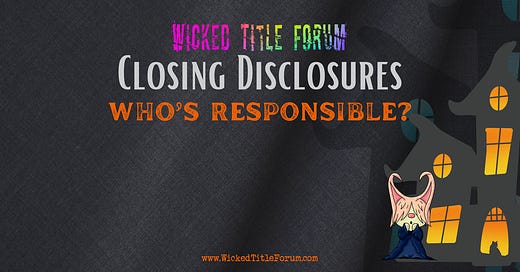Closing Disclosures! Who’s Responsible?
The closing disclosure is a critical document in any residential real estate transaction. It outlines the final terms and costs of the mortgage loan, providing both buyers and sellers with a comprehensive view of the financial aspects of the deal. The Closing Disclosure generally must contain the actual terms and costs of the transaction. (§ 1026.19(f)(1)(i)).
Today we aim to clarify the roles and responsibilities of various parties in preparing and delivering the closing disclosure and providing the final funding amount to the buyer. We’ll delve into the legal frameworks that govern these processes, including the TILA-RESPA Integrated Disclosure (TRID) rule and the Real Estate Settlement Procedures Act (RESPA) as well as the industry recommended best practices from a practical and customer service perspective.
Who is Responsible for Preparing and Delivering the Closing Disclosure to Buyers?
Who is Responsible for Delivering the Closing Disclosure to the Seller?
How to Handle Corrections to the Closing Disclosure
Who is Responsible for Providing the Final Funding Amount to the Buyer?
Who is Responsible for Preparing and Delivering the Closing Disclosure to Buyers?
Lender’s Role
The lender plays a critical role in the preparation of the Closing Disclosure. According to the TILA-RESPA Integrated Disclosure (TRID) rule, the lender is primarily responsible for ensuring that the borrower receives the Closing Disclosure at least three business days before the loan closing date. The lender is tasked with gathering all the necessary financial details, including loan terms, projected monthly payments, and costs of closing the loan. They must ensure that the Closing Disclosure is accurate and compliant with federal regulations. Any discrepancies or errors must be corrected by the lender, and a revised Closing Disclosure must be issued to the borrower.
Title Agent’s Role
The role of the title agent, while secondary to the lender, is still crucial in the preparation and delivery of the Closing Disclosure. Title agents often collaborate with lenders to gather the necessary information, such as title search results, local tax requirements and other settlement fees.
Creditors may also contract with settlement agents to have the settlement agent provide the Closing Disclosure to consumers on the creditor’s behalf. Creditors and settlement agents also may agree to divide responsibility with regard to completing the Closing Disclosure, with the settlement agent assuming responsibility to complete some or all the Closing Disclosure. (§ 1026.19(f)(1)(v)). While quoting the law makes it sound like this is a very formal arrangement between the creditor and the settlement agent, in practical application, the expectation that a settlement agent will prepare and/or deliver the closing disclosure to the buyer is simply a line item embedded with the loan instructions, so read carefully.
For Title Agent’s there are also the practical considerations from the seller, technology and customer service perspectives. In some cases, the title agent may prepare the seller’s side of the Closing Disclosure. They are responsible for ensuring that the document accurately reflects the title and settlement fees, as well as any other costs that are relevant to their role in the transaction. It is impossible to add some financials of the seller’s side of the closing disclosure without including finances that effect the buyer’s side, such as tax prorations, and deposit money. From the technology perspective, many title agents are responsible for receiving and disseminating all funds for the transaction. In order to that, an accurate closing disclosure must be prepared within the title production software to facilitate balancing the file and disbursing funds. Finally, from the customer service perspective, I think Jim Moody, owner of Encore Title Services in Jacksonville, FL, said it best “I ALWAYS inform my selling agent and buyer of the final amount necessary at closing, and provide my wiring instructions so those funds can be remitted. I do that not because it’s my job, per se, but because it certainly makes my job easier. I can’t account for a lender or agent’s communication or responsiveness, only my own. And, after these many years, I absolutely CAN count on the fact that if a buyer shows up for closing having never been informed by the umpteen gazillion professionals charged with informing them, the blame will fall on the title company/closing agent. We are the last folks they see, and therefore all manner of blame comes to rest on us.
So — after hours, during hours, weekends…if I’m balanced, have docs, and know what they need to bring, I’ll reach out and tell them. Saves me a whole lot of time.”
It is important to remember that it is the lender’s final Closing Disclosure that must be signed and becomes the official record of the transaction, so it is critical that if you are entering that data into your software, that your numbers exactly match those of the lender.
In summary, both the lender and the title agent have distinct but collaborative roles in the preparation of the Closing Disclosure. The lender is primarily responsible for its accuracy and timely delivery to the borrower, while the title agent assists in gathering specific information and may handle both the buyer and seller’s side of the disclosure.
When must the Closing Disclosure be delivered to the Buyer?…
Subscribers, scroll down to find out…
Keep reading with a 7-day free trial
Subscribe to Wicked Title Forum to keep reading this post and get 7 days of free access to the full post archives.





